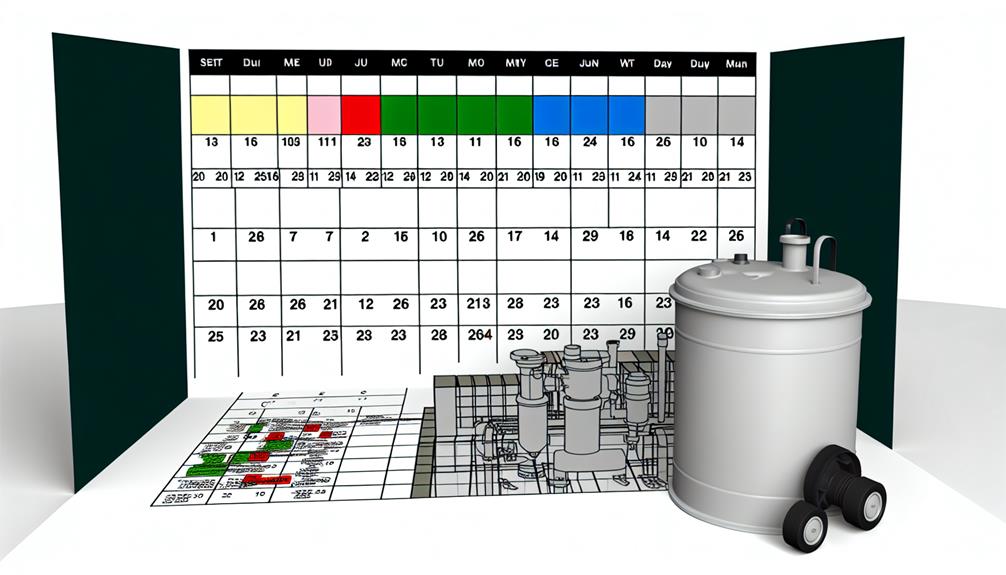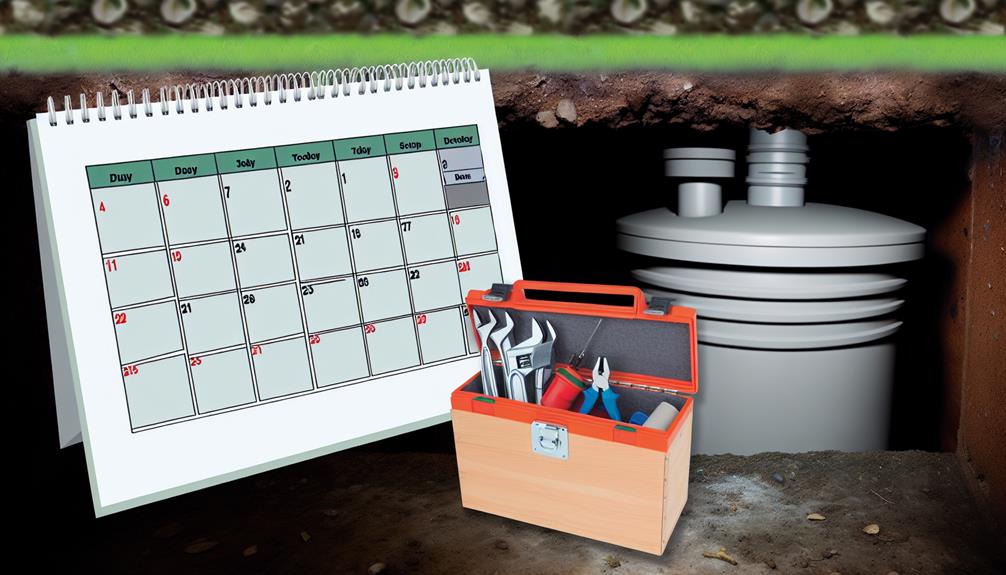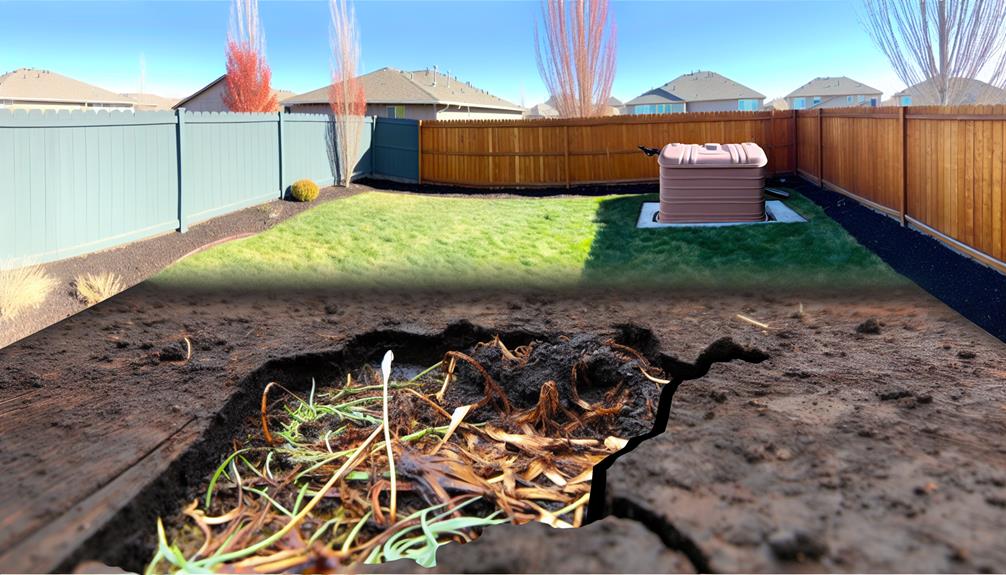Discover how to protect your septic system from breakdown with...
Read MoreYou & Your Septic Tank
Regular Septic Tank Maintenance: A How-To Guide
Our professional septic service team offers comprehensive septic tank pumping services to keep your system running smoothly. Get a FREE Quote Today.

Regular Septic Tank Maintenance: A How-To Guide
Just as a gardener tends to his plants, you too must attend to your septic tank. It’s a part of your home often overlooked, but it’s as vital as the heart is to your body, circulating waste away from your living space.
Unfortunately, it’s not as simple as setting and forgetting. You can’t just install a septic tank and hope for the best. It requires a careful touch, a regular check-in, and a fair bit of knowledge. You’re on the right track, but there’s a lot more to learn.
Why is regular maintenance so crucial, and what happens if you ignore it? Let’s get into it.
Key Takeaways
- Regular septic tank maintenance is crucial for the longevity and efficiency of the system.
- Neglecting maintenance can lead to costly repairs and a decrease in property value.
- Failed septic systems can pose health hazards and cause environmental pollution.
- Scheduling regular maintenance and taking proactive care between pumpings can save from unexpected expenses and ensure the health and safety of your household and the environment.
Understanding Septic Tank Pumping Frequency

To ensure the longevity and efficiency of your septic system, it’s crucial to understand how often you should have your septic tank pumped. The frequency of pumping varies depending on factors such as the size of your tank, the number of people in your household, and the amount of wastewater generated. As a rule of thumb, you should consider pumping your tank every three to five years.
Pumping costs may seem like a burden, but not maintaining your septic system can lead to larger expenses down the line. Failed systems can result in costly repairs and even a complete replacement of your system. Moreover, neglecting regular pumping can negatively affect property values and potentially cause health hazards.
The environmental impact of a poorly maintained septic tank should also be considered. Raw sewage can infiltrate your groundwater, polluting local waterways and harming wildlife. By having your tank pumped regularly, you’re not only preserving the life of your septic system, but you’re also protecting the environment.
Take the time to understand your septic system’s needs. Regular maintenance, including frequent pumping, is an investment in your home and the environment.
Signs Your Septic Tank Needs Pumping
Recognizing the signs that your septic tank needs pumping can save you from potential damage and costly repairs. It’s vital to understand these septic tank warning signs and respond promptly to prevent further complications.
The first sign is slow drainage. If your sinks, showers, or toilets are draining slower than usual, it’s likely your septic tank is nearing capacity.
Next, pay attention to any unpleasant odors. An overfull septic tank can produce strong, foul smells around your property, particularly near the tank or drain field.
If you notice lush, green grass over the drain field, even during dry periods, this is another warning sign that your tank could be overflowing.
Unusual sounds, such as gurgling from your plumbing system, also indicate a problem.
Lastly, if sewage backup occurs, this is a serious warning sign, and immediate action is required.
Scheduling Regular Septic Maintenance

While being alert to these warning signs is vital, you’ll find it’s equally important to establish a routine for regular septic maintenance to prevent these issues from arising in the first place. Scheduling regular septic maintenance ensures that your system runs smoothly, extends the septic system lifespan, and helps to control maintenance costs.
- Frequency: Generally, it’s recommended to have your septic system inspected every 1 to 3 years, and pumped every 3 to 5 years. This frequency can vary depending on the size of your tank and the number of people in your household.
- Timing: Try to schedule your maintenance during the warmer months. Cold weather can make the task more difficult and potentially increase maintenance costs due to additional labor involved.
- Professional Help: Hire a septic service professional for regular inspections and maintenance. They have the expertise to identify potential issues before they become major problems.
Taking these steps will save you from unexpected and potentially high maintenance costs down the line. Regular maintenance not only prolongs your septic system lifespan but also ensures the health and safety of your household and environment. Therefore, remember, prevention is always better, and often cheaper, than cure.
Septic Tank Care Between Pumpings
Maintaining your septic tank between professional pumpings is a crucial step in ensuring the longevity and efficiency of your system. The use of tank additives can play a pivotal role in this process. These substances help to facilitate the breakdown of waste, reducing clogs and backups.
You might be wondering, ‘Which additives should I use?’ The answer depends on your system’s specific needs. Some tanks benefit from biological additives like bacteria and enzymes, while others require chemical additives to function optimally. It’s important to consult with a septic professional to determine the best course of action for your tank.
Apart from tank additives use, inspecting drain fields is another essential aspect of septic tank care between pumpings. This involves checking for signs of failure, such as lush green grass over the drain field, slow draining in the house, or unpleasant odors. These symptoms could indicate an overloaded system or potentially serious damage.
If you spot any of these signs, don’t wait until your next scheduled pumping. Contact a septic professional immediately. Remember, proactive maintenance can save you a lot of trouble and expense in the long run.
Risks of Neglecting Septic Maintenance

Ignoring these essential maintenance steps can lead to serious consequences, which underscores the importance of understanding the risks associated with neglecting septic tank care.
- Health Hazards: Neglected septic systems can overflow, causing sewage to surface in your yard or backup into your home. This can expose your family and pets to harmful bacteria and pathogens, leading to illnesses.
- Environmental Impact: An overflowing or leaking septic tank can contaminate nearby water sources, including wells, streams, and rivers. This not only harms the ecosystem but also poses a threat to local drinking water supplies.
- Repair Costs: A poorly maintained septic system can lead to costly repairs or even a complete replacement. Preventative maintenance, on the other hand, is much more affordable.
Frequently Asked Questions
What Are the Environmental Impacts of a Poorly Maintained Septic Tank?
If you neglect your septic tank, it can lead to contamination of groundwater, posing serious health risks. You’re not just preventing contamination but also protecting your family and community’s health by maintaining your septic system.
Can I Use Any Type of Bathroom Cleaner or Are There Specific Ones Recommended for Septic Tanks?
You can’t use just any cleaner. Opt for cleaning product alternatives with septic-safe ingredients. Harsh chemicals can disrupt your tank’s balance, leading to environmental harm and costly repairs. Always check labels for septic safety.
How Does a Septic Tank System Actually Work?
Your septic tank system works by separating solid waste from wastewater. After tank installation, system design allows solids to settle, while liquid waste flows out to your drain field for natural filtration and absorption.
What Are Some Common Problems That Might Occur With a Septic Tank System?
You might face system overload consequences like sluggish drains or sewage backups. Unpleasant septic tank odors might also invade your yard or home. These problems, if unchecked, can lead to serious complications.
Are There Any Legal Regulations or Requirements Related to Septic Tank Maintenance?
Yes, legal regulations for septic tank maintenance exist. Non-compliance can lead to legal penalties. It’s crucial you maintain proper documentation of your maintenance activities to show adherence to these regulations.
Conclusion
So, you thought maintaining your septic tank would be a breeze, didn’t you? Think again. It demands regular pumping, careful monitoring and diligent care between services. Ignoring these chores could lead to a stinky situation you’d rather avoid.
Don’t underestimate the importance of routine septic maintenance. It’s crucial for your comfort and – let’s be honest – your nose will thank you. Keep your septic tank in good working order: your peace of mind depends on it.
You may also like...
Why Are DIY Fixes Essential for Septic Tank Pumping?
Tap into the importance of DIY fixes for septic tank...
Read MoreUnveiling the Average Costs of Septic Tank Pumping
Master the mysteries of septic tank pumping costs and avoid...
Read More
The Best Septic Tank Pumping Services Near You

Answer Some Questions
Let us know about your needs so we can find you the right septic tank pros.

Get Quotes
We will put you in touch with the right septic tank pros for your job and location.

Hire Right
Compare quotes, message or call pros, and hire only when ready.



